





Established in 1979 by owners Bob and Cathee Alex, the farm is located in the beautiful Litchfield Hills of Connecticut on 27 acres of secluded field, forest, and ponds. We are organically managed with special attention to soil biology and nutrition.
Come join the harvest!
Closed for Harvest Season 2023.
See you in 2024 for Black Raspberries.
See you in 2024 for Black Raspberries.
Black Raspberry Season
Early-Mid July
From the Kitchen
In season try our fresh seltzers and iced teas which use only the berries, herbs, and flowers we grew on the farm.
Enjoy our frozen berry juice pops crafted here on the farm too!
Hours
Closed for the season.
During the season the days and hours are subject to change.
Call ahead or check out our social media
Facebook Page
Instagram Page
for the most up-to-date hours as well as current picking conditions.
860-274-0825
2023 Berry Prices
Pick-Your-Own
Black Raspberries $7.99/lb
Pre-Picked
We do not offer pre-picked berries.
Children are welcome, but please no pets
Containers are provided or bring your own
Follow signs on Route 63 to Bassett Road
What We Grow
 Black Raspberries: Early to Mid July. Variety - Jewel
Black Raspberries: Early to Mid July. Variety - Jewel
Seasons
What makes for a deliciously sweet berry?
A year long labor of love from the farmer!
Here is a behind the scenes look at a year in the life of the farmer whose labor brings to you that wonderful summer harvest:
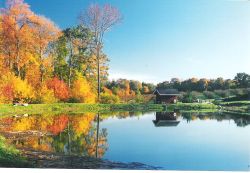
Fall:
The field is beautiful with deep red foliage on the bushes contrasting the green grass. Blueberry bushes set buds in the fall for next summer's crop. Fertilizing with compost and watering are critical to a good bud set. Also, mowing the pollinator meadow and spreading mulch for weed control keeps the farmer busy. Once fall draws to a close the irrigation system is drained for the winter.
Winter:
When the bushes are dormant (dropped all their leaves) pruning is done to remove the old canes and to promote new growth. New cane growth means new blueberries!
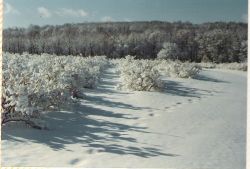
Raspberries are also pruned to remove the old canes. Old canes have a silvery peeling bark while the new canes have a smooth red appearance. Like blueberries, the fruit is produced on the new canes, not the old.
When there is inclement weather the farmer can be found in the barn where there is plenty of equipment maintenance and repairs to be done after a season of hard work.
Spring:

This is a very labor intensive season as plant and soil health is assessed and treated. Fertilizing to invigorate both the soil and plants is accomplished with a medley of natural cold pressed fish hydrolysate, compost tea, kelp, molasses, select minerals, and more applied both directly on the ground and as a foliar spray. The berries require an inch of water a week, so depending on the rain irrigation may be required. The system is turned on and checked for leaks. Weed control is accomplished by hand and continued mulching. New plants are put in. The grass is growing again too so many hours are put in on the mower. Raspberries are trellised and tied for easy harvesting and easy mowing in between the rows.
Summer:
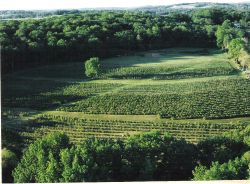
This is a very busy time of year resulting in typically fourteen hour days for the farmer. Supplies ordered in the spring arrive for the harvest season, the marketing barn is opened and cleaned, rows are marked for best picking, and post cards are mailed to let you know a new season has begun! Plastic owls, "scare eyes", flash tape, "Zelda" the mannequin scarecrow, and the mechanical bird distress call are all set out in the field for bird control. Sticky traps are used to monitor for insect pests. Soil conductivity and berry refraction data is collected to monitor the nutritional status of both the soil and the berries. Weedwacking, mowing (again!), irrigating, and a myriad of other small details that any business owner faces occupy the rest of the day.
Enjoy the berries! We enjoy having you visit each summer. And remember:
Are you well fed? Thank God, and then Thank the Farmer!
Our History
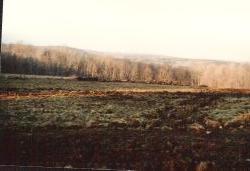 Evergreen Berry Farm was established July 13th, 1979 by current owners Bob and Cathee Alex. Originally part of Watertown's Hiram French Farm dating back to the 1800's, the 27 acre parcel was purchased as an abandoned corn field, woodlot, and wetland that had been left untended for nearly a decade.
Evergreen Berry Farm was established July 13th, 1979 by current owners Bob and Cathee Alex. Originally part of Watertown's Hiram French Farm dating back to the 1800's, the 27 acre parcel was purchased as an abandoned corn field, woodlot, and wetland that had been left untended for nearly a decade.
The inspirations for growing blueberries came from Bob's fond memories of childhood outings picking blueberries with his mom, as well as an idyllic excursion in an old model A Ford through Great Mountain Forrest of Norfolk to a secluded patch owned by his mentor Mr. Edward C Childs. Mr. Child's confidence in a young man's dream to build a berry patch for future generations of families to visit would be the catalyst for the birth of Evergreen Berry Farm in a time when farms were (and still are) fast disappearing.
The first summer of ownership was spent removing a thousand feet of trees and stones that cut the field into two sections, creating an open twelve acres ready for soil conditioning. Sulfur was applied to reverse the basic pH of the soil needed for corn crops to achieve acidic soil for blueberry production, in line with conventional wisdom. The field was also plowed and harrowed in preparation for a cover crop of red fescue grass that would eventually lie between the rows of blueberries.
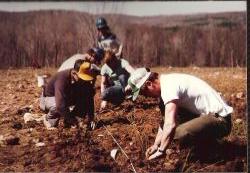
The following spring, two weeks before Bob and Cathee's wedding in May of 1980, seven thousand two-year-old blueberry whips arrived and were placed in nursery beds. Over the next three springs the bushes were individually laid out in neatly contoured rows with meticulous thought to spacing for optimum growth and access. Each bush was planted in a carefully prepared two foot diameter augured hole, mulched, and watered.Flower buds were removed by hand to prevent berry production and force the plants energy into strong root growth which would ultimately create higher yields.
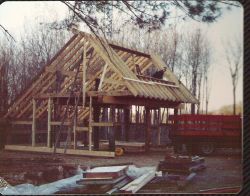
In the midst of planting, the construction of an equipment barn was accomplished in 1981 that required a special permit to be built before a home. There was no power at the barn so in the following year when the first crop was harvested berries were weighed on an old cast iron counter balance scale that had been a generous gift from Ed and Frank Gustafson of the neighboring Gustafson apple orchard. The yield from all seven thousand bushes fit entirely on the scale, which is kept at the barn to this day as a constant reminder of our beginning.
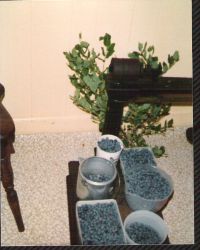
Evergreen Berry Farm first opened to the public in 1983 and was picked out in four days! In 1984 we lasted six days, and in 1985: sixteen days. Finally in 1986, we had our first full summer of daily harvesting from early July to Labor Day. In the same year, small patches of red, black, and golden raspberry were added, followed by additions of blackberry in 1996 and elderberry in 1999. A harvest season that once fit on a single scale grew to hundreds and then to tens of thousands of pounds as the farm matured.
1986 was also the year that construction began the family home on the farm. True to the old adage "new house, new baby(s)" the family grew with three children in three years with the arrival of Julie (March 1985), Caitlin (September 1986), and James (February 1988). Their childhoods became filled with running and playing in the field, forest, streams, and ponds, but also helping to run the farm and learning the value of hard and persistent work from their family.
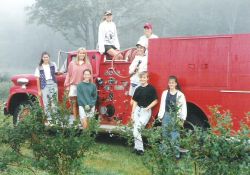 To avoid the effects of drought and maintain a consistent crop of berries, the first pond was dug in 1992. Of course as nature and luck would have it, a drought occurred in 1993 before the irrigation lines were installed. Using Yankee ingenuity, Bob put to work an old 1961 pumper fire truck. Bridgewater's retired Engine No3 brought water to each bush which was a major time consuming but necessary task. By 1995 the irrigation lines were completed allowing the berries to enjoy the inch of water a week they need during the growing season whether Mother Nature provides it or not! Nine years later a second pond at the farm's entrance was added and Bob created a gravity feed siphon to allow for the natural flow of water from the new upper pond to the original lower pond, doubling the water supply for the farm.
To avoid the effects of drought and maintain a consistent crop of berries, the first pond was dug in 1992. Of course as nature and luck would have it, a drought occurred in 1993 before the irrigation lines were installed. Using Yankee ingenuity, Bob put to work an old 1961 pumper fire truck. Bridgewater's retired Engine No3 brought water to each bush which was a major time consuming but necessary task. By 1995 the irrigation lines were completed allowing the berries to enjoy the inch of water a week they need during the growing season whether Mother Nature provides it or not! Nine years later a second pond at the farm's entrance was added and Bob created a gravity feed siphon to allow for the natural flow of water from the new upper pond to the original lower pond, doubling the water supply for the farm.
1997 brought a bigger equipment barn on the scene and paved the way for the original shed to be renovated in 2000 for "just berries". A large commercial cooler and telephone arrived and the sorting machine was positioned behind a new counter so visitors could observe the sorting and packing process of hand-harvested blueberries. Around the same time the base of our antique wagon was rescued from behind an abandoned shed at the Gunnery ponds in Washington Depot and refurbished to its original glory after the matching top was discovered and acquired from the Rockefeller estate in the Hudson River valley. The wagon holds our picking pails, is the first stop for visitors, and has become a favorite photo spot.

One of the biggest fundamental changes to the farm came after the 2012 season. Years of conventional farming practices were resulting in progressively diminished plant growth from one season to the next, instead of continued renewal. The agricultural science taught at universities and remedies provided by extension services were falling short of solving an increasing number of problems. It was at this time, after exhaustive research and at the age of 57, that Farmer Bob made a determined decision for forego all conventional farming practices that promote the use of chemical fertilizers, herbicides and pesticides, and to instead wholly incorporate only organic and biological soil, pest, and weed management techniques. (Who says you can’t teach an old dog new tricks?) His intent was to re-nourish the soil with ‘whole foods’ and promote robust and healthy soil microbiology and biodiversity, which would in turn increase the overall vigor of the plants. Additions of kelp, molasses, aged manure, minerals, humates, and other micronutrients to the soil along with foliar sprays of compost tea and fish hydrolysate served to rejuvenate the soil and the plants ability to take up nutrition via a healthier root system. Hand weeding and weed-whacking now became the sole source of weed control. Pests continued to be monitored (as they always had been with traps and an integrated pest management (IPM) system), but instead of conventional pesticides, organic products were sought out with the goal of one day creating bushes healthy enough to eliminate the need for even these.
More severe weather patterns and aging crops in recent years have added to the challenges we face as a farm. We are working hard at addressing these challenges through a comprehensive approach which entails: replanting, cover-cropping, additional drainage, and continuing to learn and employ new ways to increase and sustain the biological health and diversity of the farm as a whole. We have incorporated many Biodynamic practices into how we farm, which specifically work to maintain the farm as a thriving and self-sustaining ecosystem.
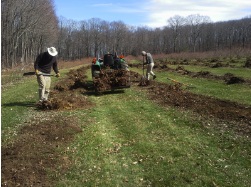
Building Evergreen Berry Farm has been and is an evolving labor of love accomplished by countless hours of toil by both family and friends. Siblings, aunts, uncles, nieces, nephews, and neighbors have all had a hand in the success of our farm. It has also been a multi-generational achievement. Until she retired in 2013 you could find Bob's mom Ruth on most mornings at the barn during the harvest season or find her tying raspberries in the spring or on the mower in the fall. When Cathee's mom Judy (a master gardener) is around on the weekends, she will make sure there are fresh flowers at the counter coupled with a friendly smile and conversation on the best berry recipes.
In 2014 Caitlin’s husband Nicholas began working alongside farmer Bob, and in 2016 the farm restructured as an LLC to facilitate possibly transitioning the farm to Caitlin and Nicholas in the hope of securing the farm’s presence for generations to come. Nicholas is a Virginia Tech grad with a background in Crop and Soil Sciences and Caitlin graduated from UConn after studying Biological Sciences. For the next few years with Bob and Nicholas spearheading the farming, and Cathee and Caitlin managing the business, new visions for the farm emerged that included a major renovation to the barn that added a commercial kitchen. This gave them the ability to process the berries and meet the new standards for the Food Safety Modernization Act. This was completed in 2017 and new seltzer's and teas made from only what is grown on the farm were introduced for visitors to enjoy while experiencing their traditional outing to harvest berries. During this transition period the farm suffered sequential seasons of severe winter kill, drought and then the wettest season in the history of the farm that impacted the berry crop and overall success of the farm. When Cait and Nick became new parents in 2018 the insecurity of the farm's income being at the mercy of the weather became a tipping point for them to step away from farming. So as the farm moved into its 40th season it continued to be managed by Bob and Cathee. It is their hope that a new chapter will evolve for the farm that will preserve its natural beauty and honor the decades of love, sweat and stewardship provided by the farmers of this land for over 150 years.
Finally you, our visitors, who berry by berry, have made the harvest possible each year must be thanked for your continued patronage. We look forward to preserving our farm for generations to come. We hope that you all have a great time making treasured family memories in the berry patches of Evergreen Berry Farm.
Bob and Cathee
Our Most Requested Recipes
No Bake Berry Pie
8 or 9 inch baked pie shell
4 cups berries
1 cup water
3 Tbs cornstarch
1 cup sugar
1 tsp lemon juice
Line a cooled 8 or 9 inch pie shell with 3 cups of fresh berries. Simmer 1 cup of mashed berries with 1 cup water for about 4 minutes. Combine cornstarch and sugar. Add to cooked fruit and stir constantly until thick and clear. Add lemon juice and cool slightly. Pour over berries in pie shell. Chill and serve!
Berried Treasures (Muffins)
2 cups flour
1/2 tsp salt
2 tsp baking powder
1 cup sugar
1/2 cup butter
2 eggs
1 tsp vanilla
1/2 cup milk
1 to 2 cups of berries
Preheat oven to 375. Grease and flower a 12 cup muffin pan or use liners. In a medium bowl combine dry ingredients. With pastry blender cut in butter until crumbly. In another bowl mix milk, eggs, and vanilla. Add to dry ingredients all at once stirring until just moistened . Do not over mix. Fold in berries and spoon into muffin pan. Bake at 375 for 30 minutes or until toothpick comes out clean. Makes 12 muffins.
Chicken Pasta Salad with Blueberries
1 (9oz) package thawed or 1 lb fresh prepared green beans
3 cups shredded cooked chicken breasts (about 1 lbs skinned and boned)
3 cups cooked fusilli (1 lb spiral pasta)
1 cup (1/2 pint) fresh blueberries
1 cup thinly sliced celery
1/4 cup thinly sliced green onions (chives or scallions)
2 tsp fresh oregano
1/2 cup plain low fat yogurt
1/4 cup and 1 Tbs mayonnaise
3 Tbs vinegar
1 teaspoon each salt and pepper
Press thawed green beans in paper towel to dry. Combine with chicken, pasta, blueberry, celery, onion, oregano in large bowl. Combine yogurt, mayo, salt, pepper, and vinegar in separate bowl and stir well. Pour over chicken mixture and toss gently. Chill and serve over lettuce. Serves 6
For a wide variety of recipe ideas visit:
http://allrecipes.com/recipes/fruits-and-vegetables/fruits/berries/blueberries/
Stewardship
We currently manage Evergreen Berry Farm biologically, an organic science that prioritizes soil nutrition to invigorate the plants. Healthy plants build strong immune systems that are better able to fend off insects and diseases. Healthy plants also produce highly productive and nutritious berries for your consumption. Biological farming practices on our farm include:
A small, intermittent stream flows from the farm into the nearby Wigwam Reservoir. The environmental care that goes into all the farming practices here at Evergreen Berry Farm helps to protect the drinking water quality of the reservoir and the aquatic habitat in the Central Housatonic Watershed. We have been recognized by the USDA's Natural Resources Conservation Service's Conservation Security Program (CSP) as a model farm.
Our farm recycles all used motor oil for tractors as well as lubricating oil for other farm equipment.
Links to more about Blueberries!
- CT NOFA
- www.CTGrown.gov
- www.pickyourown.org/CT.html
- The Sentinel: Falconry as Pest Management at Evergreen Berry Farm
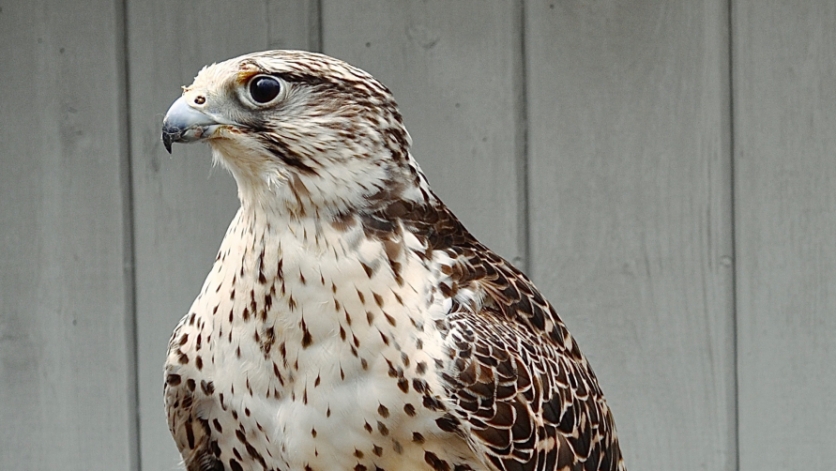
Map:
435 Bassett Road
Watertown, CT 06795
860.274.0825
evergreenberryfarm@gmail.com